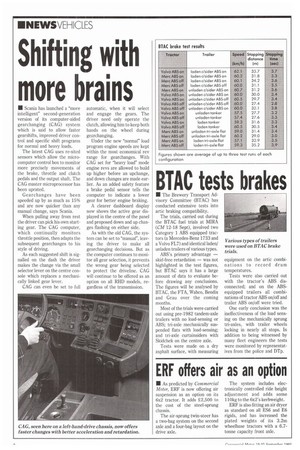BTAC tests brakes
Page 10

If you've noticed an error in this article please click here to report it so we can fix it.
• The Brewery Transport Advisory Committee (BTAC) has conducted extensive tests into artic braking compatibility.
The trials, carried out during the BTAC fuel trials at MIRA (CM 12-18 Sept), involved two Category 1 ABS equipped tractors (a Mercedes-Benz 1733 and a Volvo FL7) and identical laden/ unladen trailers of various types.
ABS's primary advantage skid-free retardation was not highlighted in the test figures, but BTAC says it has a large amount of data to evaluate before drawing any conclusions. The figures will be analysed by BTAC, the FTA, Wabco, Bendix and Grau over the coming months.
Most of the trials were carried out using pre-1982 tandem-axle trailers with no load-sensing or ABS; tri-axle mechanically suspended flats with load-sensing; and tri-axle curtainsiders with Skidchek on the centre axle.
Tests were made on a dry asphalt surface, with measuring equipment on the antic combinations to record drum temperatures.
Tests were also carried out with the tractor's ABS disconnected; and on the ABSequipped trailers all combinations of tractor ABS on/off and trailer ABS on/off were tried.
One early conclusion was the ineffectiveness of the load sensing on the mechanically sprung tri-axles, with trailer wheels locking in nearly all stops. In addition to being witnessed by many fleet engineers the tests were monitored by representatives from the police and DTp.




























































































